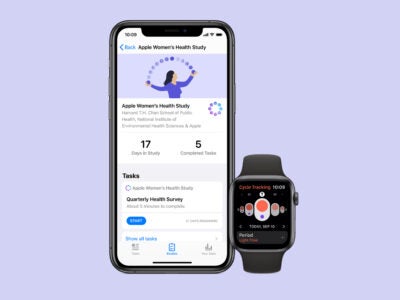Investigators at Harvard T. H. Chan School of Public Health talk about the benefits of tracking your period as a window into health

Most women experience mild symptoms before and during menstruation, while others have more severe symptoms. Tracking your period and treating the menstrual cycle as a vital sign could lead to earlier detection of many health and gynecologic conditions. Tracking your period through menstrual cycle tracking apps allows you to log details about your menstrual cycle, including period dates, blood flow, and symptoms such as mood, food cravings, headaches, acne, or cramps.
While menstrual cycle characteristics are a key variable in studies of fertility, gynecologic disease, and long-term health, they have been challenging to collect for research purposes and often overlooked. One of the most notable studies of the menstrual cycle is the TREMIN Research Program on Women’s Health[1]. While the data provided invaluable insight into the menstrual cycle patterns, this study was conducted almost a century ago using a participant group not representative of the overall population. Recent advances in our understanding of human physiology have led to a need to reevaluate the menstrual cycle. It is now appreciated that treating the menstrual cycle as a vital sign can potentially lead to the detection of many conditions, both gynecologic and systemic, earlier than traditional testing. Also, it is now realized that changes in the lifestyles of those who menstruate, including the effects of body composition, activity levels, increased life expectancy, and postponement of childbearing, may impact menses.
In the first study of its kind, the Harvard T.H. Chan School of Public Health has teamed up with Apple and the National Institute of Environmental Health Sciences (NIEHS) to gain a deeper understanding of how certain demographic and lifestyle factors could have an impact on menstrual cycles and gynecologic conditions, including infertility, menopause, and polycystic ovary syndrome (PCOS).
Every person experiences their menstrual cycle differently. Mood swings, surprising food cravings, horrible cramps, or cyclic migraines may occur in relation to your menstrual cycle. The uncertainty of not knowing when you’ll be experiencing these symptoms can make it harder to plan your work and social calendar. Tracking your period and any associated symptoms may help you manage your cycle and optimize your well-being. Your cycle tracking information also has the potential to help researchers understand the impact of your lifestyle on your periods. Cycle tracking information collected through the Health app on your iPhone, along with your survey responses, will help inform the development of innovative products for menstrual cycles, risk assessment, and screening of gynecologic conditions.
Here are some benefits of tracking your period:

- Cycle Tracking helps you understand your bleeding patterns: On average, a person may experience their period after a 21 to 35-day cycle, but that does not mean that everyone falls into this range. Tracking your period helps you understand your average cycle length, which will alert you to your next cycle.
- Cycle Tracking provides insight into your health and wellness: Sometimes, you may experience heavy periods or notice that your period pattern has become irregular. This may suggest a possible underlying condition or may help identify a significant change in your lifestyle. Logging your period and the symptoms you experience will help you recall these events when you talk with your health care provider.
- Cycle Tracking helps identify symptom patterns and helps you plan: Tracking your cycle may help in identifying patterns for your emotions, food cravings, and symptoms such as breast tenderness. Knowing these patterns may help you plan out your work and social calendar.
Conclusion: Tracking your period is a way of learning about your body and health. Contributing accurate menstrual cycle data via an app greatly improves our research on menstrual cycles and will lead to impactful scientific insights in menstrual cycle health.
Thank you for participating in the Apple Women’s Health Study and contributing to discovery in women’s health.
Here is a link with instructions on how to log your menstrual cycle in the health app on your iPhone: https://support.apple.com/guide/iphone/track-your-menstrual-cycle-iph51a822b18/ios




You must be logged in to post a comment.